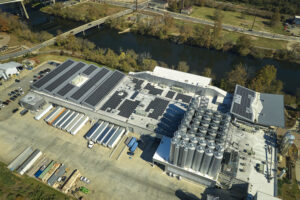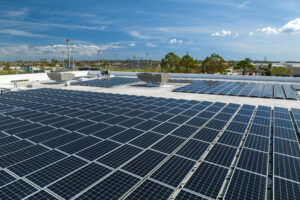NCCETC Promotes Smart Manufacturing in the Growing Renewable Energy Sector
North Carolina has always been a hub for manufacturing, ranking as the number one largest manufacturing workforce in the Southeast United States. Since the 1820s, manufacturing corporations have existed in traditional industries such as textiles, pulp and paper, cement, and food processing. As clean energy investment has advanced, manufacturing sector capacity has followed, resulting in modern growth sectors like wind, solar, batteries, and clean transportation. Companies have started to prioritize decarbonization of energy, which coupled with the demand for load growth and the expenses of new infrastructure, is driving them to find cost effective clean energy solutions.
The NC Clean Energy Technology Center (NCCETC) has worked with both traditional energy intensive manufacturing companies and with clean energy sector manufacturers to provide energy efficient practices that will aid the processes of these facilities. Isaac Panzarella, Associate Director of NCCETC, says “as companies are investing in clean energy manufacturing capacity, they want to do the best they can to minimize their carbon footprint, which is something we can help them with.” The Center has become more focused on working to support manufacturers in clean energy that are expanding and creating jobs throughout the Southeast.

The Clean Power and Industrial Efficiency (CPIE) team at NCCETC has collaborated with companies such as Kempower, Toyota, Wolfspeed and Siemens to provide market information and technical assistance throughout their expansion. Panzarella notes that with clean energy companies, it’s within their values to not only make energy, but to use it. As Director of the U.S. Department of Energy (DOE) Southeast Onsite Energy TAP, his team works to provide analysis for manufacturing companies to evaluate onsite energy that they can incorporate into their facilities.
Another way the Center has worked to support clean energy in manufacturing is through the Environmental Protection Agency’s (EPA) Pollution Prevention (P2) and Lean for Sustainable and Green Manufacturing project, of which NCCETC is a subrecipient working with East Carolina University. This project allows the CPIE team to conduct energy audits of select industrial processes to improve operational efficiency, leading to the reduction of waste that would otherwise cause air and water pollution. So far, the team has been able to provide analysis through this project for large manufacturers including Post Consumer Brands and FUJIFILM Diosynth Biotechnologies.

A recent DOE initiative, the State Manufacturing Leadership Program, has named North Carolina as one of the 12 funding recipients to run a state-wide program intended to make smart manufacturing technologies more accessible. The project, led by the North Carolina Department of Commerce, is funded by the Bipartisan Infrastructure Law, and will support small and medium manufacturers (SMMs) in implementing and accessing smart manufacturing technologies. To support the Commerce team, NCCETC and Industry Expansion Solutions at NC State University will pull together a network of companies in the smart manufacturing space to increase awareness and access to these technologies. Panzarella says a key component of the project is to close the supply chain loop and bring materials back to be “recycled, repaired, or remanufactured”. The project description states, “By establishing an innovative and collaborative resource ecosystem, partners will be able to help support 500 participating SMMs close identified gaps in their digital transformation journey.”
The CPIE team will be attending the 2024 Southern Automotive Conference on September 30 – October 1 in Chattanooga, Tennessee, where major manufacturing companies such as Volkswagen, Mercedes, and Toyota will be present. This engagement will help the team connect with the companies present to raise awareness of assistance on clean energy deployment available through the Center. With companies looking to build new facilities in the Southeast, the process can be lengthy, but starting early with onsite energy and other smart manufacturing technologies in mind will produce long term benefits.
As the manufacturing sector continues to evolve, NCCETC will stay at the forefront of providing technical expertise to ensure facilities are maximizing energy efficiency. The growth of renewable energy in the manufacturing sector will offer countless opportunities not only for the economy, but for advanced technologies to pave the way towards a more sustainable future.